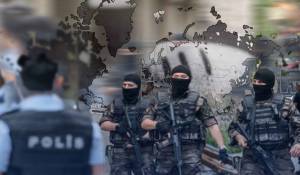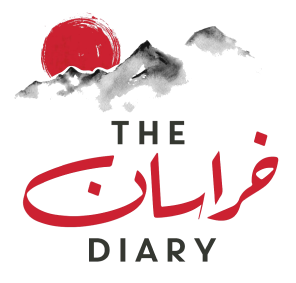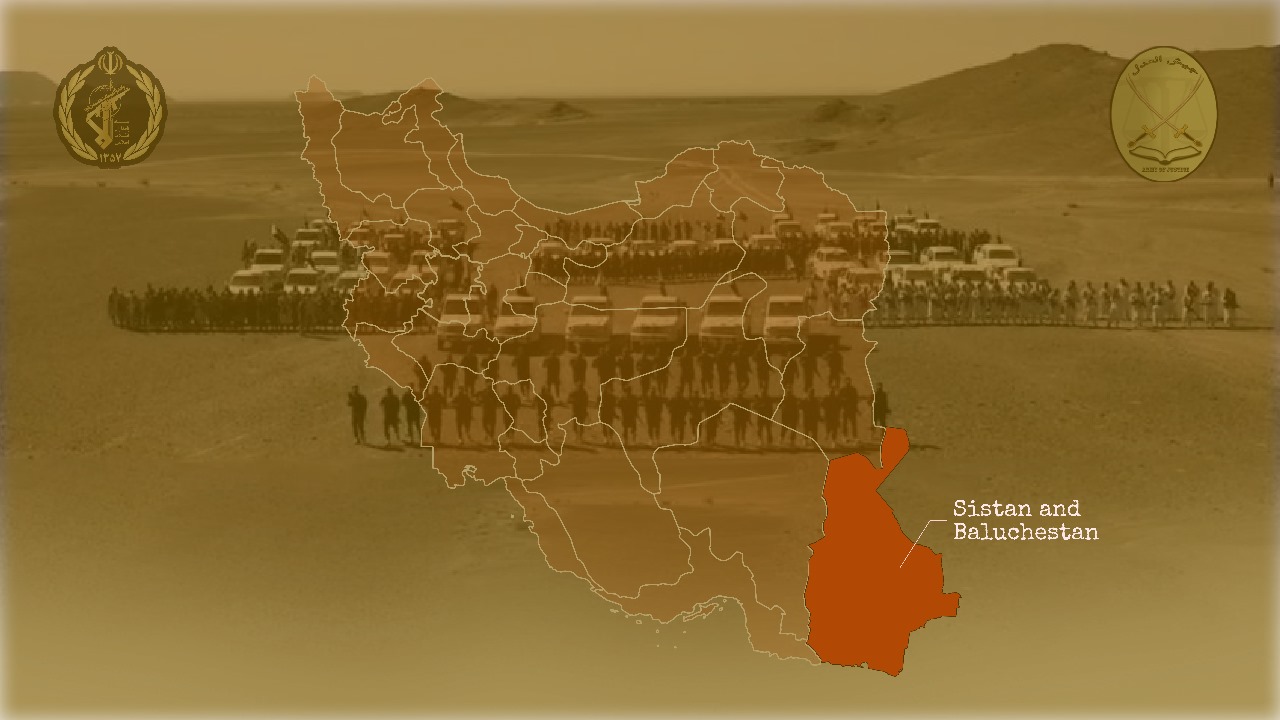The increase in propaganda over the past year, with very interesting media material, of the Iran-based jihadist group Jaysh al-Adl, prompted me to contact the group's current spokesman Hossein Baloch and ask him for a detailed interview.
Jaysh al-Adl, “Army of Justice”, operates in the areas of Sistan & Balochistan, an Iranian province that is home to a large community of Sunni Muslims suffering from alleged discrimination by the Iranian regime.
The group has been declared a terrorist organization by the government in Tehran, which in the past has accused it of being a group that is supported by the United States, Israel, Saudi Arabia and the United Arab Emirates to destabilize the country and its government.
Jaysh al-Adl was founded in 2012 (more details on the foundation and composition will be provided by the spokesman himself in the interview), by the current leader Salahoodin Farooqi. The group's main targets are, members of the IRGC (Islamic Revolutionary Guard Corps), border guards, police force, government officials and barracks.
The group’s latest media publications have focused on two things one is the dissemination of statements claiming attacks against Iranian security forces and the second is video messages in which their militants can be seen getting armed training.
The group has issued three statements in the last four months, in which it claimed three attacks including the killing of an Iranian army colonel Mohammad Heydari in the city of Saravan, an attack against Iranian police in Sib and Suran county, and another attack on an Iranian police station in Zahedan, claiming to kill two policemen. Later on, they also released photos of the “Fadayan Adl Elahi” battalion that conducted that attack.
Meanwhile, the group also published three videos, one showing all the stages of the training of its fighters in the mountains of Sistan and Balochistan, the second, essential, of about 10 minutes entitled 'A message for spies and informers of security agencies', in which the speaker informs that “no mistake will be justified and that all those who play the role of informers and spies of the Iranian regime will be arrested and risk death”.
Furthermore, the speaker said that “the war has begun and will not stop until victory comes”.
Finally, the third video, almost 20 minutes long, shows and claims the arrest, trial and death sentence of three spies who were reportedly part of a militia linked to the IRGC.
The detailed interview covers numerous aspects of the group and the answers are very wide-ranging and comprehensive, allowing a full understanding of the group's objectives.
Question (Q): Can you briefly tell who are you and what is your position in this organization?
Hossein Baloch (HB): Thank you for arranging this interview. I am Hossein Baloch, a member of Jaysh al-Adl. I am currently serving as the spokesperson for the organization.
Q: Can you explain the history of this organisation?
HB: The history of our organization traces back to a period of uncertainty following the capture of Amir, Abdul Malik, which led to divisions within the Balochistan People's Resistance Movement (Jundallah). Amidst this disarray, various groups emerged, each advocating different ideologies and engaging in conflict. Recognizing the lack of political and combat activities in Balochistan, our leader, Mr. Salahuddin Farooqi, who had been observing these developments, initiated a new movement.
In early 2012, Mr. Salahuddin Farooqi, accompanied by several fighters, established Jaysh al-Adl, aiming to address the grievances and rights of the people of Balochistan and the Sunnis of Iran.
Through strategic approaches aligned with the realities on the ground, our leader successfully attracted numerous fighters to Jaysh al-Adl, consolidating its position as the primary armed organization in Balochistan. This consolidation was aimed at securing the inalienable rights of the Balochistan people and the Sunnis of Iran.
Q: What is the goal of this struggle?
HB: Our objective is evident and explicit. If you've been following our operational reports and occasional statements issued after armed conflicts, as well as on various occasions, you would recognize that we have consistently articulated our aim. Our goal is to overthrow the Iranian government and restore the dignity of the Iranian people, particularly the Baloch Muslims and other Iranian ethnic groups, notably the Sunnis of Iran.
We are exhausted by the discrimination and atrocities perpetrated by this sectarian regime against us. We refuse to allow this oppressive government to dictate our fate and shape our future. Utilizing our country's financial and human resources, it relentlessly assaults our beliefs and us, propagating its lethal ideology globally, resulting in the squandering of the nation's human and financial assets.
Q: Are all of your fighters Iranian Nationals?
HB: Yes, all of our fighters are Iranian Baloch. However, some of our (non-Baloch) Iranian compatriots are also present among our ranks.
Q: Why did you decide to engage in armed struggle?
HB: We, the people of Iran, are captives in the hands of a small and sectarian group. This government has based all its affairs on religious beliefs, which generally carry an apocalyptic flavour. When they oppress us or make decisions against the national concept, they never consider it as something negative.
Understanding the fundamental politics of Iran would help clarify this perspective. The logic of this government is solely determined by profit and loss; it offers concessions where it perceives threats to its interests, otherwise, it shows no will or intention to change or tolerate. The issue arises from Khamenei's (Iran’s Supreme Leader) recent explanation during his meeting with officials of the Ministry of Foreign Affairs of Iran in which he emphasized that this concession is not based on a sustainable strategy but a tactic to achieve the goal.
Screengrab of a video released by Jaysh al-Adl on affiliated media channels in which the militants can be seen patrolling in an unidentified area.
Q: What is the structure of the organization?
HB: Jaysh al-Adl comprises of five primary sections:
Leadership: This section includes the top leader and decision-making departments such as the central council and specialized advisory groups.
Information and Security Department: It operates in two parts—gathering information from the enemy's organization and protecting against enemy attacks.
Military Department: This department is further divided based on geographical divisions, currently comprising six units operating in specific geographical areas.
Social and Political Sector: This sector operates in three main areas:
Department of Relations: Interacts with the public and influential elders to strengthen organizational relations.
Department of Communications: Responds to queries from people, different groups, and other individuals about the organization.
Political Department: Engages with political figures and parties, aiming to define common interests.
Financial Sector: Manages the financial affairs of the organization.
"Jaysh al-Adl operates independently with specific and limited goals. Consequently, the groups you mentioned (Ed: Al-Qaida and affiliates) show no interest in engaging with us. Some of these groups have tactical alliances with the Iranian regime."
|
Q: Is this group exclusively composed of Sunnis from Sistan and Baluchistan?
HB: Presently, the majority of our members consist of Balochs from the Sistan ve Balochistan province. However, we also include Sunni forces from various other regions across Iran. In Jaysh al-Adl, we believe in a shared destiny for all Iranians, striving for unity to bring prosperity and progress to our land. We welcome all Iranians to join us in this endeavour.
Q: Does Jaysh al-Adl collaborate with other armed groups?
HB: We are open to cooperation and interaction with various politically and militarily active ethnic groups in Iran to collectively challenge the Iranian regime, which stands as a common adversary.
Q: Do you accept foreign fighters into your group?
HB: Presently, despite the challenging circumstances prompting many young individuals to see death as the only option, we do not actively seek foreign fighters. Moreover, our infrastructure isn't currently equipped to incorporate foreign fighters.
Q: Many in the West and Iran label Jaysh al-Adl as a terrorist group. What is your perspective?
HB: It's understandable that Iran deems us terrorists within its own criteria. However, it's regrettable that certain countries, potentially due to conflicting interests with the Iranian regime, share this view. Our actions have consistently aligned with common human values, avoiding actions such as targeting civilians or destroying public infrastructure. Regrettably, our outreach remains limited, mainly subject to the propaganda and security apparatus of the Iranian regime. We believe our Islamic principles guide our actions.
Q: What are your thoughts on the political situation in Iran?
HB: We perceive the Iranian regime as fragile, yet its fall isn't guaranteed. Despite its delusional ideology, the regime tactically manoeuvres to protect its sovereignty. Overthrowing the government decades ago might have prevented the calamities Iran faces today. The regime appears weak now, but a strategic approach is crucial. Failing to capitalize on this moment might lead to historical repetition. We urge all involved in Iranian affairs to make prudent decisions for a favourable outcome.
Q: What kind of operations do you undertake and against what targets?
HB: We are committed to targeting only repressive entities, including Faraja (police force) and the Revolutionary Guards (Sepah e Pasdaran). Additionally, our focus extends to officials within the judiciary and intelligence services.
Screengrab of a video released by Jaysh al-Adl on media channels in which the militants can be seen discussing.
Q: What is the relationship between Jaysh al-Adl and other jihadist groups like al-Qaeda? What are your thoughts about them?
HB: Jaysh al-Adl operates independently with specific and limited goals. Consequently, the groups you mentioned show no interest in engaging with us. Some of these groups have tactical alliances with the Iranian regime.
"Afghanistan's prolonged history of war precedes the Taliban. Presently, global consensus and engagement with the Taliban seem a positive step toward stability and prosperity for Afghanistan and the world." |
Q: How do you aim to persuade Iranians to continue the path of Jihad?
HB: Our Baloch community adheres to Jihad as an Islamic principle. The current regime obstructs any possibility of reform, leading many to believe that armed struggle is the sole means to escape religious oppression.
Q: What is your vision for the future government in Iran?
HB: Given Iran's political chaos, offering a specific perspective is challenging. However, active popular engagement assures any future government will surpass the sectarian Iranian regime.
Q: What is your perception of the Islamic State?
HB: In reviewing Jihad's contemporary history, no extremism akin to the organizations you mentioned was observed during past jihads against non-Muslim aggressors. While these groups may have disagreements, they demonstrated effectiveness in repelling invasions and garnered support from the Islamic Ummah.
Q: What are your thoughts on the Taliban's actions in Afghanistan?
HB: Afghanistan's prolonged history of war precedes the Taliban. Presently, global consensus and engagement with the Taliban seem a positive step toward stability and prosperity for Afghanistan and the world.
Q: What is your stance on regional countries' differing positions towards Iran?
HB: The Velayat al-Faqih regime in Iran has inflicted severe harm on Muslims globally. Iran's role in conflicts in Syria, Iraq, Yemen, and Lebanon, fueling sectarianism, has caused substantial Muslim casualties. Iran, with its vast resources and interactions, plays a pivotal role in these calamities.
Q: What message do you convey to the Western world's often prejudiced judgment of you?
HB: We aim for recognition as we truly are: dedicated fighters sacrificing for our people and common beliefs, devoid of worldly incentives. Western governments' misconceptions and prejudices often lead to egregious mistakes in understanding complex issues. We hope for a more accurate assessment.
Q: What is your perspective on the media portrayal and Western countries' foreign policy towards Mujahideen groups? Where are we mistaken, and what are we failing to comprehend?
HB: Though I doubt my suggestions will be heeded, but I'd like to express my viewpoint. In my opinion, Westerners need to revise certain stereotypes regarding Muslims and show respect for the beliefs of those who pose no harm to them. They should evaluate issues based on factual evidence, independently from one another. It's essential to recognize that just as there are authoritarian regimes within democracies, jihadist organizations exhibit diverse perspectives. Therefore, it's prudent for discerning governments to perceive these matters as they truly exist, not merely as imagined. Perceptions often stem from misconceptions and incomplete, biased information.
I believe that if the media accurately fulfil their role by presenting issues as they are, free from sponsor interests and personal biases of journalists, factual information will proliferate in society, gradually revealing the truth to all. Consequently, decision-makers can arrive at more suitable choices aligning with their own interests."
- Thank you very much
-HB: Thanks to you for arranging this interview.
Conclusion:
The detailed interview makes the objectives of the jihadist group clear. The primary objective is to overthrow the regime in Iran. The group also aims to support the Iranian Sunni component, in particular the Baloch people and other minority Iranian ethnic groups, such as the Iranian Kurds, among others. The group clearly has local Jihadi objectives, far from global Jihadism (as specified in one of the replies), also demonstrated by its willingness not to accept foreign fighters into its ranks and its readiness to cooperate in fighting the Iranian regime only with local groups.
Given the localised armed struggle advocated by Jaysh al-Adl, the group differentiates itself from jihadist organisations with regional or global aspirations, such as al-Qaeda or the Islamic State. Similarly to Syrian jihadist groups, Jaysh al-Adl advocates for an exclusively local armed struggle, both ideologically and operationally, resembling more a resistance or insurgent group.
In fact, the Iran-based jihadist group, during its activities, has tried to avoid any military activity that could hit civilians (officials and spies are not considered civilians by them, as they perform roles in favour of the regime's governmental system), attack infrastructure and public places, or kill prisoners (in fact, referring to the Islamic State’s operations, it claims “in the contemporary history of Jihad, no such form of extremism has ever been observed”).
In their responses, there is an urgent need to act and speed up the conduct of the armed struggle in order to exploit the moments of weakness experienced by the government in Tehran, which is stranded in regional and global geopolitical dynamics that are not easy, but military capabilities and support are limited for a governmental overthrow (as they themselves acknowledge “unfortunately we don't have a platform to present ourselves, so our recognition is limited”).


